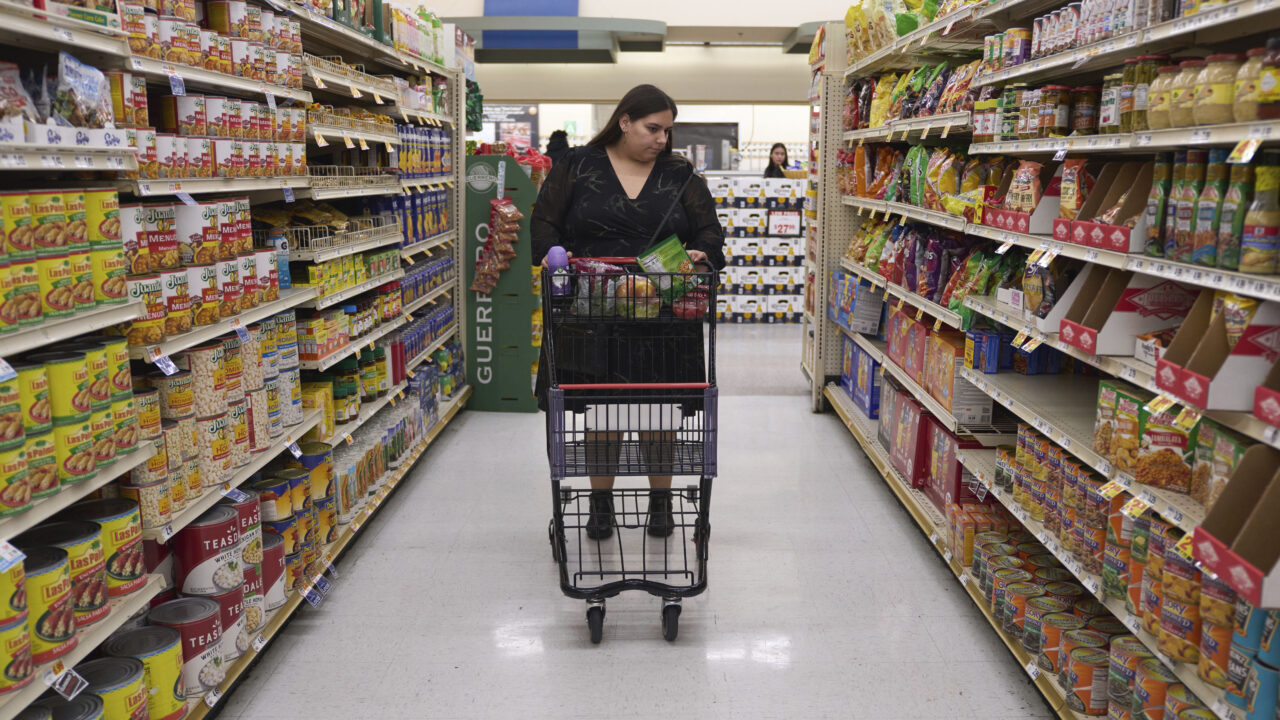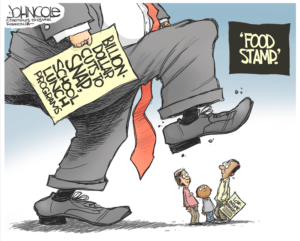More Than 500,000 Americans Are About to Lose Their SNAP Benefits
An additional 750,000 older adults are newly at risk thanks to the return of pre-pandemic work-reporting requirements. Jaqueline Benitez pushes her cart down an aisle as she shops for groceries at a supermarket in Bellflower, Calif., on Monday, Feb. 13, 2023. (AP Photo/Allison Dinner)
Jaqueline Benitez pushes her cart down an aisle as she shops for groceries at a supermarket in Bellflower, Calif., on Monday, Feb. 13, 2023. (AP Photo/Allison Dinner)
An ineffective SNAP policy that takes food assistance away from people who can’t meet a work-reporting requirement will return this summer, after being paused during the public health emergency. This will mean that people who are between jobs, who have health conditions or caregiving responsibilities that impede work at least temporarily, whose work hours fluctuate, or who face challenges navigating the red tape of the reporting and exemption systems will be at risk of losing the food assistance they need to buy groceries.
About 500,000 — and possibly closer to 1 million — of the nation’s lowest-income adults will be cut off SNAP beginning in October 2023, as the program’s work-reporting requirement returns after being temporarily suspended during the pandemic. The long-standing work-reporting requirement limits benefits to three months in a 36-month period for adults aged 18-49 who aren’t disabled or raising minor children in the home unless they report work or training activities of at least 20 hours a week.
The requirement was suspended during the COVID-19 public health emergency, which ended on May 11. As a result, the work-reporting cut off will go back into effect this summer in most areas of the U.S., despite clear evidence that this requirement takes food assistance away from people who need it and doesn’t increase employment — the goal proponents of this requirement say they are seeking.
The provision goes into effect beginning September 1, 2023 for 50-year-olds, October 1 for 51- and 52-year-olds, and October 2024 for 53- and 54 year-olds.
Individuals subject to the work-reporting requirement will lose their food assistance benefits after three months if they cannot document that they are working or engaged in a qualifying work program for 20 hours or more a week or secure an exemption. The impact will be felt in 43 states that must or are choosing to reimpose the work-reporting requirement in 2023.
Moreover, the recent debt ceiling agreement phases in an expansion of this work-reporting requirement to adults up to age 54. That will put an estimated 750,000 adults aged 50-54 at risk of losing food assistance because they are newly subject to this harsh and ineffective policy. The provision goes into effect beginning September 1, 2023 for 50-year-olds, October 1 for 51- and 52-year-olds, and October 2024 for 53- and 54 year-olds. The agreement also provides temporary exemptions from the time limit for veterans, people experiencing homelessness, and former foster youth up to age 24. States will need to identify these individuals for them to be exempt.
These CBPP estimates are based on pre-pandemic SNAP household characteristics data, caseload trends, and Agriculture Department (USDA) information on approved 2023 waivers of the requirement in areas with insufficient jobs. But the number of people cut off will depend on several factors about which we lack full information, including the number now participating in SNAP who will be subject to the work-reporting requirement, which states will seek waivers, how closely the reimposition of the work-reporting requirement this year will resemble the impact when it returned after the Great Recession, and how quickly and effectively USDA and states implement the debt ceiling agreement’s new exemptions.
Most SNAP participants who can work, do. But the work-reporting requirement is based on an unfounded assumption that people who receive benefits do not work and must be compelled to do so — an assumption rooted in prejudices about people based on race, gender, disability status, and class. It also ignores the realities of the low-paid labor market, such as unpredictable schedules and a lack of paid sick days, the impact of work-limiting health conditions and caregiving needs on a participant’s ability to find and keep consistent work, and ongoing labor market discrimination.
Put simply, taking food away from people doesn’t encourage work. Numerous studies in the decades since the work-reporting requirement for 18- to 49-year-olds took effect have shown that the policy doesn’t increase employment or earnings — it just cuts people off from the food assistance they need to buy groceries. Even people who should be exempt from the rule due to disability, another qualifying exemption, or working 20 hours per week can lose benefits because these work-reporting requirements are complex bureaucratic hurdles that are costly for states to implement and difficult for people to navigate.
The impact will be felt in 43 states that must or are choosing to reimpose the work-reporting requirement in 2023.
SNAP’s work-reporting requirement has disproportionately affected people of color: over one-quarter of adults who were potentially subject to the requirement before the expansion under the debt ceiling agreement were Black and nearly one-quarter were Hispanic, compared to the overall U.S. population, of which about 12 percent are Black and about 19 percent are Hispanic. About 45 percent of those potentially subject to the requirement are women.
The loss of this food assistance, which averages approximately $235 per person per month for this group, or under $8 per person per day, will cause serious hardship for many and will come just months after the pandemic-related emergency allotments ended for many participants. The individuals likely to be cut off have average monthly household income of approximately 32 percent of the poverty line, USDA data show, and they typically qualify for no other income support.
SNAP’s long-standing purpose is to protect the well-being and food security of low-income individuals and families by helping them afford a more nutritious diet. As past and current SNAP participants affected by the work-reporting requirement share in our video series from Maine, taking away food assistance benefits from people who are out of work increases the risk of food insecurity and hunger for adults not living with minor children.
With the return and recent expansion of this counterproductive requirement, states need to begin planning to ensure that eligible participants remain connected and that organizations that work directly with those at risk are aware of the upcoming changes and their effects.
Your support matters…Independent journalism is under threat and overshadowed by heavily funded mainstream media.
You can help level the playing field. Become a member.
Your tax-deductible contribution keeps us digging beneath the headlines to give you thought-provoking, investigative reporting and analysis that unearths what's really happening- without compromise.
Give today to support our courageous, independent journalists.








You need to be a supporter to comment.
There are currently no responses to this article.
Be the first to respond.